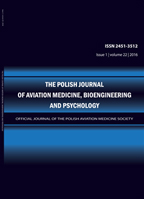2018, Volume 24, Issue 3
COGNITIVE IMPROVEMENTS FOLLOWING BODY MASS REDUCTION INDUCED BY INTRAGASTRIC BALLOON PLACEMENT IN MORBIDLY OBESE PATIENTS. A PRELIMINARY STUDY
Michał JANEWICZ1, Marek BINDER2, Agata GAŹDZIŃSKA3, Olaf E. TRUSZCZYŃSKI4, Aleksandra MOJKOWSKA5, Piotr ZIELIŃSKI6, Stefan P. GAŹDZIŃSKI7
-------------------------------------------------------------------------------------------------
1SWPS University of Social Sciences and Humanities
2Institute of Psychology, Jagiellonian University
3Department of Pathophysiology and Flight Safety, Military Institute of Aviation Medicine
4Institute of Psychology, Cardinal Stefan Wyszyński University
5Department of Surgery, Military Institute of Aviation Medicine
6Department of Aviation Psychology, Military Institute of Aviation Medicine
7Creative Neuroscience Lab – CNS Lab, Military Institute of Aviation Medicine
Autor korenspondencyjny: Stefan P. GAŹDZIŃSKI; Creative Neuroscience Lab – CNS Lab, Military Institute of Aviation Medicine; email: stefan.gazdzinski@yahoo.com
Full text
Streszczenie
Introduction: Obesity and type 2 diabetes mellitus (T2DM) are associated with poorer cognitive performance. Reports suggest that bariatric surgery may lead to improvements in cognitive processes. However, the potential effects of mood improvements have not yet been evaluated. The aim of the study was to assess the effects of intragastric balloon (IGB) induced weight loss on cognitive performance in morbidly obese patients and relate them to changes in mood.
Methods: Twenty four morbidly obese patients (43.9±12.0 years of age, 145.6±22.3kg, body mass index (BMI): 49.8±6.9, 11 females, 14 with T2DM), underwent tests of visual short-term memory (Benton Visual Retention Test), sustained and divided attention (Color Trail Test), and verbal short-term memory: (Digit Span from WAIS-R) 1) a month before IGB insertion, 2) three months after, 3) one month after IGB removal. Depressive symptoms were evaluated with the Beck Depression Inventory (BDI).
Results: Significant cognitive improvement was observed over the first three months of IGB treatment in verbal short-term memory, visual short-term memory, and sustained and divided attention among all patients, regardless of their T2DM status. However, these changes correlated with weight loss only in patients without comorbid T2DM. The cognitive changes were not associated with changes in depressive symptoms. The improved cognitive performance was sustained over the last three months of the treatment.
Conclusions: Morbid obesity treatment with an intragastric balloon leads to cognitive improvements. These improvements are not associated with mood changes.
Słowa kluczowe
cognition, obesity, type 2 diabetes mellitus, bariatric surgery, metabolic surgery, intragastric balloon
